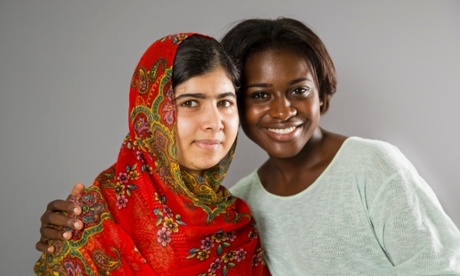
In 2012, I crossed the finish line in my A-level studies: no easy feat while working part time at Topshop. I’d stay after school to clock in a few hours of revision in particle physics, then start the evening shift manning the changing rooms. In the backdrop, there was the euphoria of the run-up to the London 2012 Olympic and Paralympic Games – I was to work in the Olympic Park serving noodle soup. London felt more alive that summer than I’d ever experienced it. I had also been accepted to study politics and sociology at Bristol University and by September I was fully stocked up on bed linen and crockery, ready for the independence of university life.
It was the year I came across Malala Yousafzai, the fearless youth activist from the mountainous Pakistani district of Swat. In October 2012, aged 15, she became the subject of the world’s headlines after she was shot by a member of the Taliban who stopped her school bus. Known to Talibs because she had campaigned for the education of girls in Pakistan, in both local and international media, Malala was asked for by name, and three shots were fired. Two weeks later she woke up in Birmingham, having been airlifted to the UK in a critical condition. At the Queen Elizabeth Hospital she made an extraordinary recovery. Unable to speak at first, she communicated with doctors by notebook; after four weeks she was able to move her face and smile.
I am passionate about political activism – on behalf of the pressure groupLondon Citizens I made a speech to Jean Tomlin, HR director of the Olympics in London, asking that workers receive the living wage – but Malala’s story was a shocking reminder that in many parts of the world, standing up for change could cost you your life. Now 17 and living in Birmingham with her parents and two younger brothers, Malala has seen her life change almost beyond recognition in the past two years.
Propelled to global prominence, her campaigns have found support from everyone from the Queen to Angelina Jolie. On her 16th birthday she gave a speech at the UN in New York, where she urged leaders to wage a global struggle against illiteracy, poverty and terrorism. When we meet, she has just returned from Nigeria, where she appealed to the president to take responsibility for the recovery of more than 200 abducted schoolgirls.
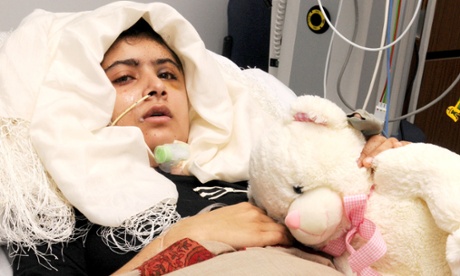
When I was that age, I had thought my whole world would collapse if I didn’t get the GCSE grades I wanted. But Malala, while studying in Birmingham, is as motivated as ever in her fight for children’s educational rights. In a new book aimed at young people, she says: “The Taliban shot me to silence me – instead, the whole world is listening to my message now.”
We are introduced in a private room at the Library of Birmingham, now the largest public library in Europe. Malala officially opened the library in September 2013 but says she has only been back once, maybe twice, preferring to study at home. She doesn’t seem completely comfortable in the environment and, instead of the assertive, confident character I have seen on television, she is quiet and unassuming. She wears a bright red patterned salwar kameez but almost shrinks into it. As we get into our interview, she starts to become more animated, and she has the habit of tugging her head scarf down and replacing it when she is talking passionately about a topic. She is most at ease when we are talking about the two interests we have most in common: politics and education.
We have met on a Sunday because Malala is currently studying for her GCSEs. These are still a year away but she has a rule about taking time off school. “I will only miss school for an engagement if it is going to bring real change,” she says. “That is the question I have to ask myself with each request and if the answer is yes, I say, ‘OK, I will sacrifice one day of my school for the education of millions of children who are out of school.’” In the beginning she said yes to “many, many” invitations. “But then I realised my studies were being affected.” She is determined to get straight As next year, before going on to do A-levels. “I’m going to choose the arts subjects,” she says. “Definitely not the sciences.”
We share a smile. Like Malala, who wanted to be a doctor while living in Swat, I was once on the path to study medicine. We discuss the prestige the profession holds in certain cultures and the overlap between Pakistani culture and my West African heritage. “In Swat,” she says, “there are two jobs a woman’s going to do: a teacher or a doctor. If not, then become a housewife.”
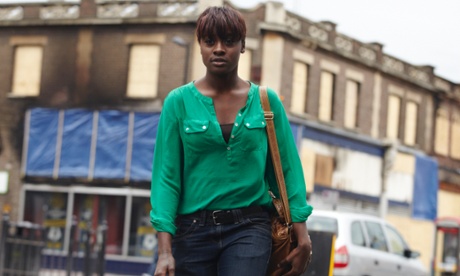
I am curious to know if she still talks to her childhood friends and what they are doing now. “We Skype all the time,” she says. “We just talk about the normal things. Sometimes I think, what did we talk about? Nothing! And something! It’s just like the conversation goes on. Like, how is the other girl? And they say, ‘Oh, she got married.’ Because now most of them have got engaged.”
How does that make her feel?
“I feel really sorry for them. Like, they are 17, 18 – they are allowed, according to the law, to get married, but I was telling them you should have continued your education. The problem is that their husband’s family says she can continue her education if they get married. But sometimes they promise and they do not do it. And then she gives birth to a child and the child grows, and another baby comes.”
Right now her best friend Moniba is being courted for marriage. “There was an engagement offer and she said: ‘No one is going to listen to me.’ So I told her if she can’t say no, just don’t say yes! Because that means you are not agreeing – if they ask you.”
Would she like to have a family one day?
She giggles. “Not yet. Maybe!”
We discuss how we would both like to be part of a generation that has contributed to breaking down barriers. Of the issues she would like to focus on, Malala cites child labour, child trafficking and child marriages. Recently she has become involved in a campaign against FGM. “It doesn’t happen in Pakistan,” she explains, “so this was the first time I knew about it. People think, ‘Oh, everything is good here because it is a developed country,’ but I have seen that there are things here that need to be highlighted and solved.”
Living in the UK came as something of a culture shock. There was the “cold, damp” weather. And when she started at Edgbaston High School for Girls, she was taken aback: “They have computer labs, science labs, nice books – everything you need. And the internet!” She laughs. “Before I came here, in my whole life in Pakistan I did not do a single piece of research on Google. Not a single!” There are aspects of western culture she has found difficult to accept. “What I get a bit angry about is the image of women. It gets quite difficult for me when I listen to pop music. I don’t often understand the words, but when someone translates them to me, I think, ‘What is this song representing? That women are just there to be treated like objects?’ Most of the time they do not even make sense. And the thing is that most of the female artists seem to have accepted all this. But they have a role to play.” She shakes her head. “The politicians, too.”
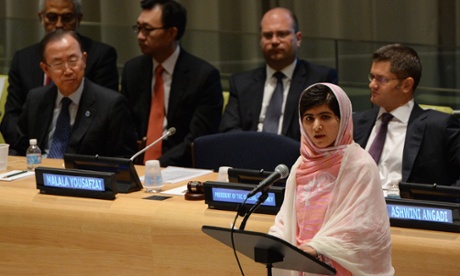
We talk about the apathy young people seem to feel towards politics in this country. Has Malala noticed young people aren’t as passionate about campaigning here as they are in other places? “In every country politics is considered to be a waste of time. Young people don’t really say, ‘Oh, let’s go into politics.’ But I think if there is a law in your country that goes against your human rights, you are more likely to want change.”
What advice would she give to someone who believes there is a major injustice in their local community but they don’t know how to start to make an impact?
“I think it’s easy. There are lots of people who will start by thinking, ‘Who do I meet to say something? Where do I go?’ But the thing in front of you is social media. Use it. In Swat we were just giving interviews to TV channels, telling them we want our education and what the Taliban is doing is wrong. But it is quite hard to stand up and say that when a Talib is standing in front of your house. It is easy to make a peaceful protest on Facebook.”
She acknowledges that her voice has been heard so widely because her experience has been extreme: “At the moment people are really listening to me and supporting me. But I also know that might change. I know the response might not be the same in five years, ten years. So I do not rely on support. You cannot rely on other people’s support. It does not happen by itself.”
Her ambition is to become prime minister of Pakistan. Her hero is Benazir Bhutto. When Malala was in hospital, Bhutto’s children came to visit and gave her two of Bhutto’s shawls as a gift. Malala wore one of them when giving her UN speech. Does she worry about her security, if she did go back to Pakistan?
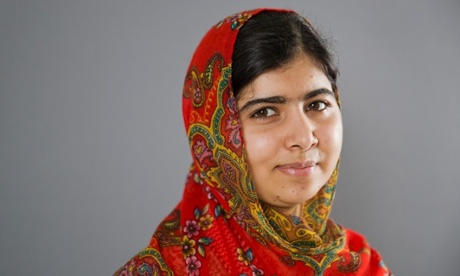
“I can go right now!” she smiles. “But the fact is that I want to get my education – a good university education. A lot of the politicians have studied in Oxford, like Benazir. My dream is to empower myself with education, and then it is a weapon.”
Despite death threats from the Taliban (these have also been aimed at Malala’s father, who continues to run a school in Swat and is an education attaché in the UK for the Pakistani consulate in Birmingham), she says she does not worry about security in this country. “It is safe. You can’t have weapons in this country so it’s good. But the other thing is, my family live like normal people. If you have the police in front of your house, you’re just trying to show people, ‘This is our house.’” And besides: “One day we have to die. You can’t stop death from coming.”
As someone who struggles to balance work with studies, friends and family, I’m intrigued to know how Malala fits everything in. Once a day she emails the team who co-ordinate her diary and run the Malala Fund (malalafund.org) and there are weekly conference calls about campaigns. She says she would like to spend more time keeping up with politics in Pakistan, “but I can’t. I do not have the time to read about all of it. My father reads BBC Urdu constantly, so he will inform me of things.”
At school, she says she has struggled to fit in, that she has never wholly been able to shake off the label of “Malala, the girl who was shot in the head by the Taliban”. “I just try to be a normal student,” she says now. “But then they say, ‘I saw you on TV.’ It is hard!”
I am intrigued about who the real Malala is. In her book, published this month, she says she finds it hard to find “the cheeky Malala” she once was. Before we go, I want to ask her about this – I feel I have started to see glimpses. Earlier in the interview she imitated “Brummie English” to make me laugh, and when we have our photo taken together at the end of the day, she makes more jokes and poses with me for a selfie. When we say goodbye, she hugs me. I want to tell her I hope she feels she has found something of a friend in me. Instead, I make her promise to invite me to her palace when she becomes the prime minister of Pakistan. She says just so long as I invite her to mine.
Malala: The Girl Who Stood Up for Education and Changed the World, published by Orion Books, is out now. To order a copy for £10.39 with free UK p&p go to guardianbookshop.co.uk or call 0330 333 6846

No comments:
Post a Comment